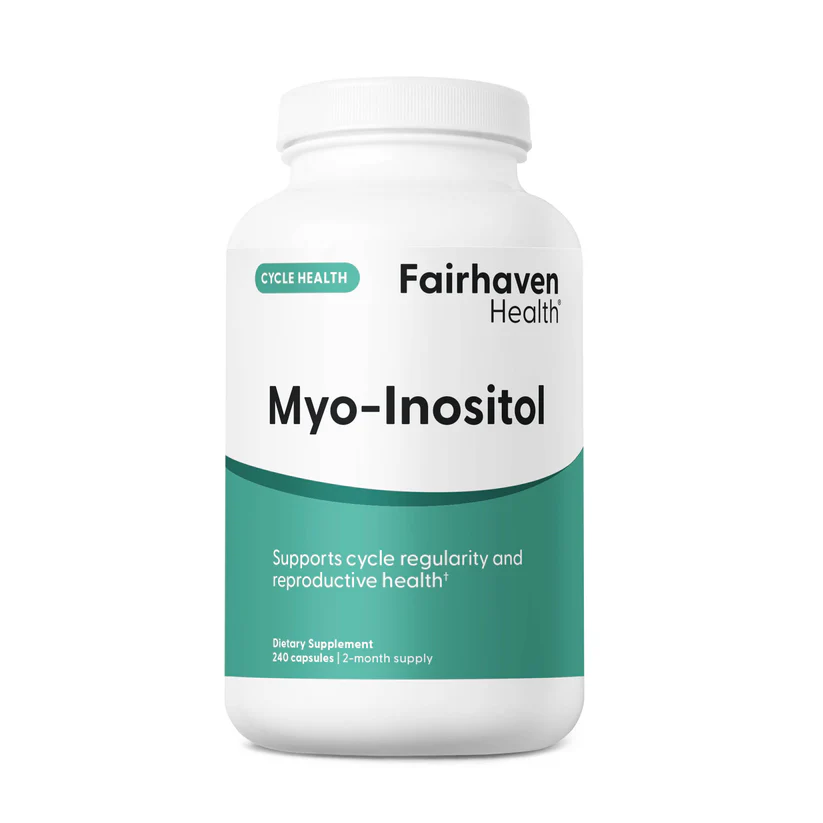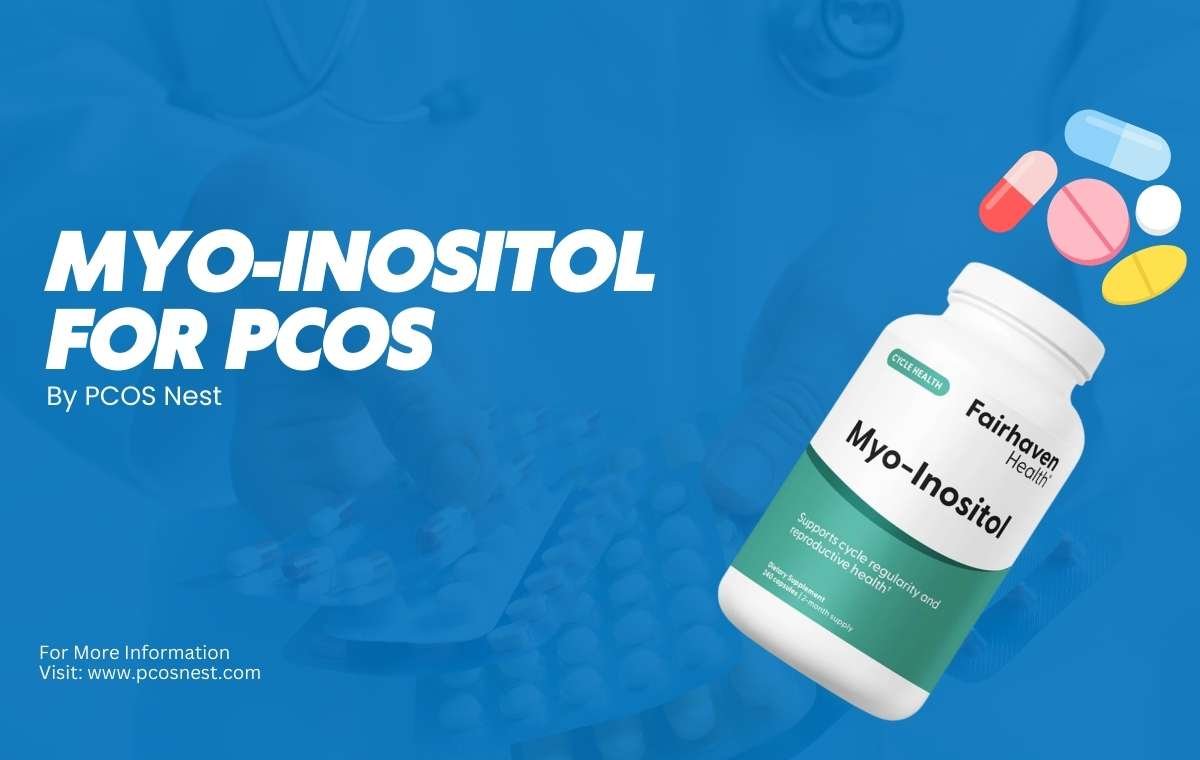Introduction:
Polycystic Ovary Syndrome (PCOS) is one of the most common hormonal conditions affecting women of reproductive age. It can cause irregular periods, infertility, acne, excessive hair growth, and weight problems. Along with hormonal imbalance, insulin resistance and metabolic issues play a major role in PCOS. Over the years, researchers have been exploring natural compounds that may help manage PCOS symptoms. Myo-Inositol, a vitamin-like substance belonging to the B-vitamin family, has gained attention as one of the most promising supplements for women with PCOS. This article will explain how Myo-Inositol works, its uses, recommended doses, clinical evidence, and safety profile.
What is Myo-Inositol:
Myo-Inositol is a naturally occurring substance that looks like a sugar but functions more like a signaling molecule in the body. It is part of a group of compounds called inositols, of which Myo-Inositol is the most abundant form. It is found in fruits, beans, grains, and nuts, and our body can also produce it naturally from glucose. Myo-Inositol plays an important role in insulin signaling, hormonal balance, and cellular communication. Because insulin resistance is a major problem in PCOS, researchers started looking at Myo-Inositol as a natural solution for improving insulin sensitivity and restoring hormonal health. PMC

How Myo-Inositol works in PCOS:
Myo-Inositol influences several processes in the body that are highly relevant to PCOS. The most important is its role in insulin signaling. Insulin resistance, which is common in women with PCOS, means that the body does not respond properly to insulin, leading to higher blood sugar and higher insulin levels. Myo-Inositol helps the body respond better to insulin, improving glucose uptake by the cells. This improvement reduces excess insulin in the bloodstream, which can also lower high androgen levels, one of the main drivers of PCOS symptoms like acne, hair growth, and irregular ovulation.
Additionally, Myo-Inositol has positive effects on ovarian function. It helps regulate follicle-stimulating hormone (FSH) signaling, which is essential for the growth and maturation of ovarian follicles. Women with PCOS often have multiple small follicles that do not mature properly. By supporting healthy follicle development, Myo-Inositol may improve ovulation and fertility outcomes.
Uses of Myo-Inositol in PCOS:
Improving menstrual cycle regularity:
One of the most common struggles in PCOS is irregular or absent periods. Clinical studies suggest that Myo-Inositol can improve menstrual cycle regularity by enhancing ovulation. Regular ovulation leads to more predictable menstrual cycles and increases chances of natural conception.
Supporting fertility:
Myo-Inositol is often used in women with PCOS who are trying to conceive. Studies have shown that it may improve the quality of eggs, increase ovulation rates, and enhance pregnancy rates. In some cases, it has been compared with medications like metformin and clomiphene, showing similar or supportive effects without many of the side effects associated with drugs.
Reducing insulin resistance and metabolic risk:
Since insulin resistance is central to PCOS, reducing it can have widespread benefits. Myo-Inositol has been shown to lower fasting insulin levels, improve insulin sensitivity, and sometimes reduce body mass index (BMI). By lowering insulin resistance, it also reduces the risk of developing type 2 diabetes and metabolic syndrome in women with PCOS.
Lowering androgen levels and improving skin health:
Excess androgens are responsible for symptoms like acne, oily skin, and unwanted hair growth. By reducing insulin resistance and indirectly lowering androgen production, Myo-Inositol can help improve these cosmetic symptoms, making it a popular natural remedy among women looking for non-pharmaceutical options.
Supporting mental health:
PCOS is often linked with mood swings, depression, and anxiety. Some studies suggest Myo-Inositol may support mental health by improving serotonin signaling, though this effect is less studied compared to its metabolic and reproductive benefits. However, since improved hormone balance and lower inflammation often benefit mood, many women report feeling better overall while using Myo-Inositol.

Also Read: Does Metformin Cause Weight Loss?
Dosage of Myo-Inositol for PCOS:
The most common dose used in clinical studies for PCOS is 2000 mg of Myo-Inositol taken twice daily, for a total of 4000 mg per day. This dosage has been shown to improve ovulation, menstrual cycles, insulin resistance, and hormone levels in many women. Sometimes Myo-Inositol is combined with D-Chiro Inositol in a specific ratio (usually 40:1) because this combination may better mimic the natural balance of inositols found in the body.
Supplements are available in powder or capsule form. The powder can be dissolved in water and is often tasteless, making it convenient for daily use. It is important to be consistent, as improvements may take several weeks to months to become noticeable. Women should consult with their healthcare provider before starting supplementation, especially if they are already taking other medications for blood sugar or fertility.
Evidence from clinical studies:
Several clinical trials and systematic reviews have examined the effects of Myo-Inositol in women with PCOS. Studies have shown that Myo-Inositol supplementation can improve ovulation rates, increase pregnancy rates, reduce insulin resistance, and lower testosterone levels. In many cases, its benefits are similar to those of metformin, a commonly prescribed medication for PCOS, but with fewer gastrointestinal side effects.
In fertility treatments such as in vitro fertilization (IVF), Myo-Inositol has been found to improve egg quality and reduce the risk of ovarian hyperstimulation syndrome. This makes it a supportive option for women with PCOS undergoing assisted reproductive technologies.
Meta-analyses have generally confirmed that Myo-Inositol is effective and safe in managing several aspects of PCOS, although results vary depending on study design, duration, and population. Overall, evidence supports its use as part of a comprehensive management plan for PCOS.
Safety and side effects:
Myo-Inositol is generally considered safe, with very few reported side effects. At standard doses, it is well tolerated, and most women do not experience problems. Mild gastrointestinal symptoms, such as nausea or flatulence, can occasionally occur but are uncommon. Since Myo-Inositol is a naturally occurring compound in the body, it does not carry the same risks as many pharmaceutical drugs.
However, women should not self-prescribe high doses without medical guidance. Pregnant and breastfeeding women should consult their doctor before use, even though studies suggest Myo-Inositol is safe during pregnancy, particularly in reducing gestational diabetes risk.
Limitations of current evidence:
While the evidence for Myo-Inositol in PCOS is promising, it is important to note that not all women respond equally. Some women may see significant improvements, while others notice only small changes. More research is needed to determine which subgroups of women benefit the most and to establish optimal dosing strategies in combination with other therapies.
Additionally, most studies focus on short- to medium-term use. Long-term safety and effectiveness studies are still limited, so healthcare providers typically recommend periodic evaluations when taking supplements for extended periods.
Conclusion:
Myo-Inositol is one of the most researched natural supplements for PCOS. It plays a vital role in improving insulin sensitivity, supporting ovulation, lowering androgen levels, and enhancing fertility. With a favorable safety profile and evidence from multiple clinical trials, it offers a natural alternative or complementary option for women managing PCOS. The typical recommended dose is 4000 mg per day, often combined with D-Chiro Inositol for additional benefits. While it is not a cure for PCOS, it can significantly support hormonal balance, reproductive health, and overall well-being. Women considering Myo-Inositol should discuss it with their healthcare provider to ensure it fits into their personalized treatment plan.
References:
- Therapeutic role of Myo-Inositol in Polycystic Ovary Syndrome (PMC review)
- International PCOS Guideline (ESHRE/ASRM Monash University report)
- Effects of Inositol on Insulin Resistance and Ovulation in PCOS (Journal of Clinical Endocrinology & Metabolism)

